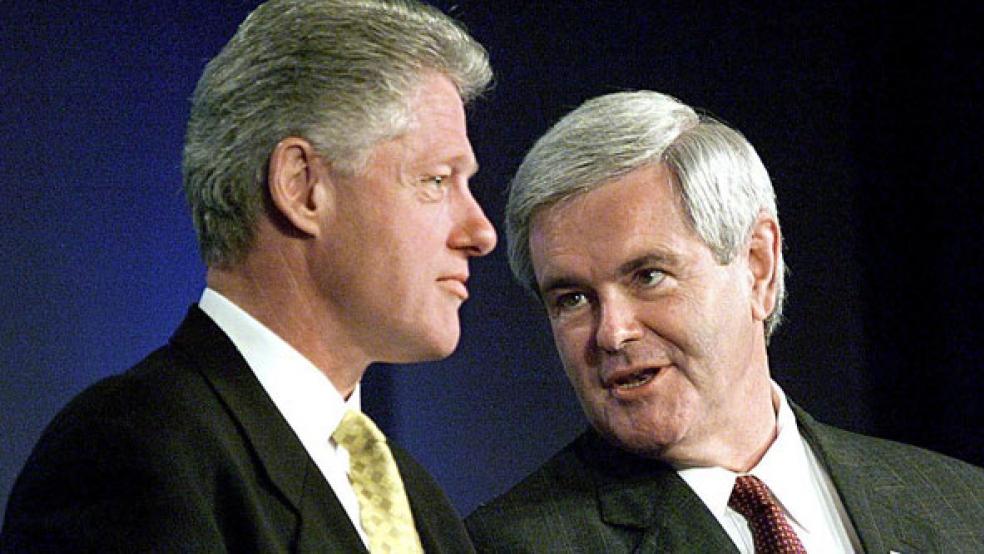The new Republican speaker of the House demands a major downsizing of government, but has to yield to pressure from conservative freshmen to cut spending even more. The political atmosphere is so poisonous that some Democrats blame Republican rhetoric for triggering an act of political violence that shocks the nation.
Meanwhile, the Treasury is dangerously close to exhausting its borrowing authority and pleading with Congress to raise the debt ceiling. But conservative activists say that without serious action on deficit reduction they'll let the deadline pass, risking default on the nation's public debt. And a growing stalemate over the GOP's deep spending cuts threatens a government shutdown that some conservatives welcome as a test of wills.
Sound familiar?
This reads like a summary of events leading up to next week’s spending showdown between President Obama and congressional Republicans that could end on March 4 by closing down much of the government for the first time since 1995. In fact, though, it’s a description of the eerily similar things that happened 16 years ago, when Democratic President Bill Clinton faced off with House Speaker Newt Gingrich, R-Ga., Senate Majority Leader Robert J. Dole, R-Kan., and a band of newly elected conservative GOP revolutionaries who were determined to slash spending, balance the budget and remake the government. Now President Obama heads into an almost identical showdown with House Speaker John Boehner, R-Ohio, and Senate Minority Leader Mitch McConnell, R-Ky. Like Gingrich, Boehner sits uneasily at the head of a huge group of avid but largely untested conservative freshmen who are impatient with their leader’s calls for restraint.
Then, as now, there was little love lost between the parties. Newly elected Republicans radiated contempt for Democrats they felt had diminished the nation not just fiscally, but morally. In April 1995, some Democrats quickly blamed the Republicans’ harsh anti-government rhetoric for egging on the right-wing terrorists who bombed a federal building in Oklahoma City, killing 168 people. Sixteen years later in January 2011, some Democrats quickly blamed Republicans’ use of gun-related imagery when talking about Democrats – don’t retreat, reload -- for fostering the turbulent atmosphere in which a lone gunman shot a congresswoman in Arizona, gravely wounding her and 12 others, and killing six.
In both years, angry Democrats had just been ejected from office and majority power was held by Republicans who believed they alone channeled the will of the people. In 1995 the parties badly needed to find common ground, but mutual animosity made that harder and harder. As the year ground on, grudges grew and differences widened.
In many ways 2011 feels like a replay: Energized Republicans command national attention with a seemingly unstoppable assault on federal spending. A first-term Democratic president struggles to adjust to his diminished status by moving to the center and distancing himself from some of his party allies – just as Clinton found a way to “triangulate” between the two parties. The House Budget Committee chairman Paul Ryan, R-Wis., becomes the unlikeliest of media rock stars, just as John Kasich of Ohio did during the “Republican Revolution” of the mid-1990s. Looming confrontations over the national debt and an expiring spending bill create a dangerously uncertain political atmosphere in which it seems that almost anything could happen, and either side could win triumphantly or lose disastrously.
To be sure, there are some important differences. In 1995, Republicans controlled both the House and the Senate. Today the GOP controls only the House, and the Senate is still at least nominally an ally of the president. Gingrich was a manic, polarizing visionary, while Boehner is a steadier, middle-of-the-road conservative who is more pragmatist than ideologue. Gingrich and his fellow leaders had little appreciation for the risks involved in closing down the government for extended periods for the first time in history. And they had no understanding of how angry and vindictive the public could become when they saw politicians squabbling while agencies shut, hundreds of thousands of federal workers went without paychecks and ordinary people confronted locked doors at passport offices, museums and national parks, and endured delays in getting VA and Social Security checks.
Boehner by contrast, lived through the 1995 debacle as chairman of the House GOP Conference and a member of Gingrich’s leadership team. Better than anyone else in his caucus, he understands the risks and knows how to avert a shutdown, or if there is one, how to try to make sure his party doesn’t get the political blame for causing it.
What follows are excerpts from Balancing Act – Washington’s Troubled Path to a Balanced Budget (Vintage Books), a 1998 book we wrote that describes events leading up to the two 1995 government shutdowns, and how events shaped the budget negotiations that eventually helped lead to four years of balanced budgets in 1998-2001.





